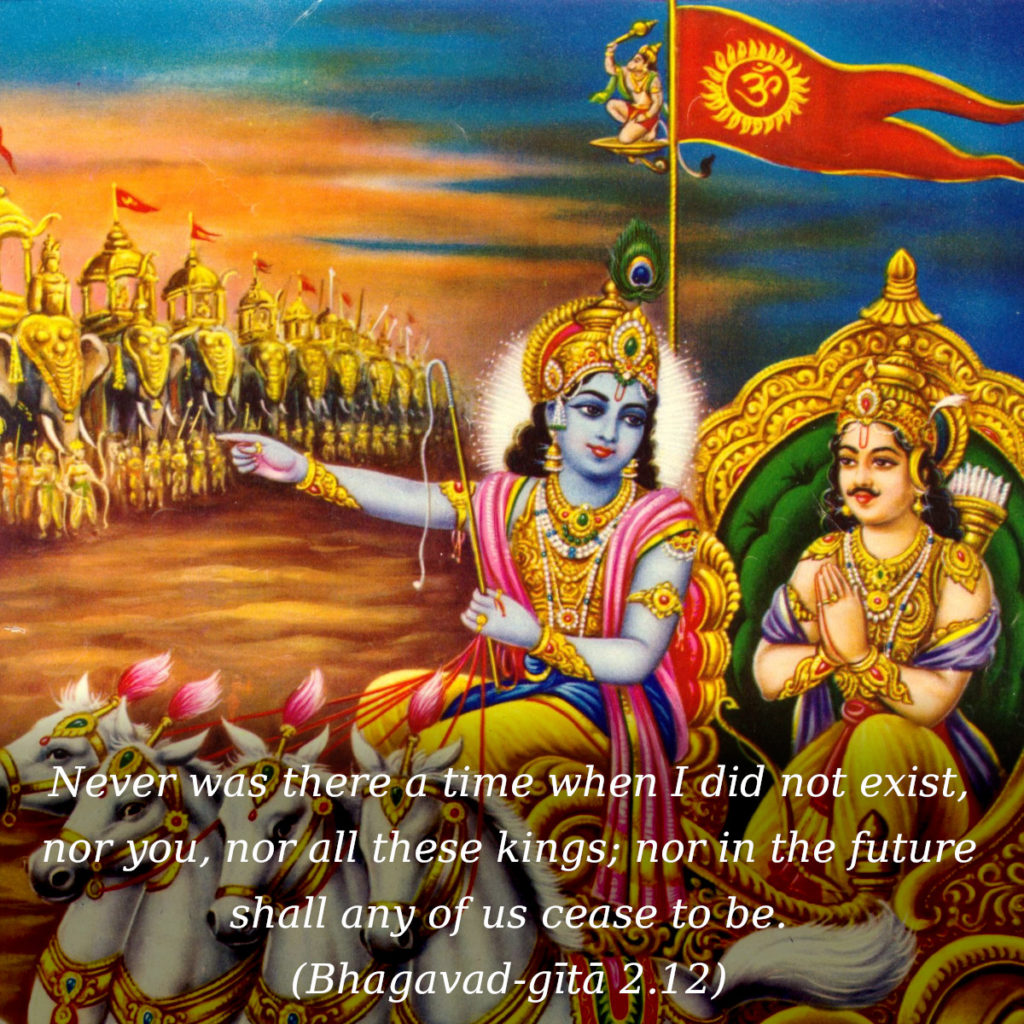न त्वेवाहं जातु नासं न त्वं नेमे जनाधिपा |
न चैव न भविष्याम: सर्वे वयमत: परम् || 12||
na tvevāhaṁ jātu nāsaṁ na tvaṁ neme janādhipāḥ
na chaiva na bhaviṣhyāmaḥ sarve vayamataḥ param
na—never; tu—however; eva—certainly; aham—I; jātu—at any time; na—nor; āsam—exist; na—nor; tvam—you; na—nor; ime—these; jana-adhipāḥ—kings; na—never; cha—also; eva—indeed; na bhaviṣhyāmaḥ—shall not exist; sarve vayam—all of us; ataḥ—from now; param—after
Translation:
Never was there a time when I did not exist, nor you, nor these kings of men. Never will there be a time hereafter when any of us shall cease to be.
Commentary:
Through this verse, the Lord teaches the `Mahavakya’ “tat tvam asi” (Thou art That) ‘I’, ‘you’ and all beings in the world are all forms of the one Supreme Self. So the individual being and the Supreme Being are not two separate entities, but one and only one. This is the most secret of all spiritual secrets. This is the essence of Brahma Jnana. Since Arjuna renounced all the powers and pleasures of the three worlds, Lord Krishna considered him fit to receive the supreme knowledge, and so begins to teach the highest Truth.
Three important facts come out in the Lord’s declaration that all beings are eternal.
- Atma is eternal,
- Each individual being is Atma and not the body with name and form,
- The one Atma pervades all beings in the world.
This teaching inspires tremendous strength and courage. When a man comes to know that he and others essentially do not perish, there is no cause for grief at all. Death is then regarded as only a change of name and form. When the seed breaks up and grows into a plant, there is no need for grief at all. The name and form of the seed have disappeared, but it is there in the form of a plant. Lord Krishna found out the root cause of Arjuna’s grief and sorrow, and he knew that the knowledge of Atma alone could put an end to all weakness and despondency. So he starts his teaching with the tremendous affirmation of the immortality of the Soul and the deathlessness of the individual being.
All of us hereafter: ‘all of us’ – From the point of view of the Supreme Self, there is no separation between God, Guru, and the common man. All belong to the same eternal existence. So we find that Anjaneya speaking to Sri Rama says: (Atma budhya tvamevaham). The individual being manifesting as the ego is the result of the limitations of the body, mind, and senses. When these `limitations are discarded, the so-called individual being, the ego, becomes veritably the all-pervading Supreme Self. That is the Reality. Knowing that he is the immortal Atma, where is sorrow, where is weakness? Thus the Lord inspires Arjuna with courage born of knowledge.
Swami Vivekananda Says —
You cannot die nor can I. There was never a time when we did not exist. There will never be a time when we shall not exist.[Source]
People talk about the beginning of the world, the beginning of man. The word beginning simply means the beginning of the cycle. It nowhere means the beginning of the whole Cosmos. It is impossible that creation could have a beginning. No one of you can imagine a time of beginning. That which has a beginning must have an end. “Never did I not exist, nor you, nor will any of us ever hereafter cease to be,” says the Bhagavad Gita. Wherever the beginning of creation is mentioned, it means the beginning of a cycle. Your body will meet with death, but your soul, never.[Source]

Question: who is Jiva?
Answer: The Atman conditioned by the body, mind, and senses is Jiva. :
Question: What is Atma? :
Answer: The unconditioned Self is Atma. It exists in the present, the past, and the future. It is deathless and eternal.
Question: Does this apply only to a few?
Answer: No, From the creating Brahman down to the meanest insect, it applies to all alike. All beings without exception are the Atma and not anything else.
❮ Previous Next ❯